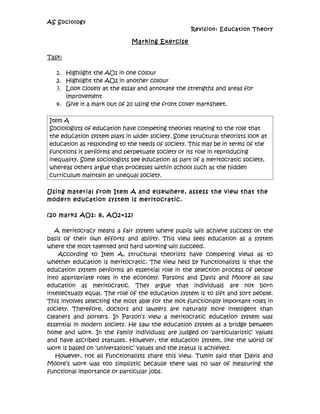
SociologyExchange.co.uk Shared Resource
- 1. AS Sociology Revision: Education Theory Marking Exercise Task: 1. Highlight the AO1 in one colour 2. Highlight the AO2 in another colour 3. Look closely at the essay and annotate the strengths and areas for improvement 4. Give it a mark out of 20 using the front cover marksheet. Item A Sociologists of education have competing theories relating to the role that the education system plays in wider society. Some structural theorists look at education as responding to the needs of society. This may be in terms of the functions it performs and perpetuate society or its role in reproducing inequality. Some sociologists see education as part of a meritocratic society, whereas others argue that processes within school such as the hidden curriculum maintain an unequal society. Using material from Item A and elsewhere, assess the view that the modern education system is meritocratic. (2o marks AO1: 8, AO2=12) A meritocracy means a fair system where pupils will achieve success on the basis of their own efforts and ability. This view sees education as a system where the most talented and hard working will succeed. According to Item A, structural theorists have competing views as to whether education is meritocratic. The view held by Functionalists is that the education system performs an essential role in the selection process of people into appropriate roles in the economy. Parsons and Davis and Moore all saw education as meritocratic. They argue that individuals are not born intellectually equal. The role of the education system is to sift and sort people. This involves selecting the most able for the mot functionally important roles in society. Therefore, doctors and lawyers are naturally more intelligent than cleaners and porters. In Parson’s view a meritocratic education system was essential in modern society. He saw the education system as a bridge between home and work. In the family individuals are judged on ‘particularistic’ values and have ascribed statuses. However, the education system, like the world of work is based on ‘universalistic’ values and the status is achieved. However, not all Functionalists share this view. Tumin said that Davis and Moore’s work was too simplistic because there was no way of measuring the functional importance or particular jobs.
- 2. AS Sociology Revision: Education Theory Other structural theorists like Marxists see education as ‘reproducing social inequality’ (Item A) and reject the view that education is a meritocracy. They see that education really functions in the interest of the ruling class, Althusser saw education as an Ideological State Apparatus, which legitimates class inequality in society. Bowels and Gintis showed that there was a correspondence between the education system and the economy. The economy ‘cast a long shadow over education’. This means that the schools exert ideological control and molded according to the needs of capitalism. Through the hidden curriculum children learn to be obedient and to respect authority. Relationships between teachers and students are said to mirror those of employers and employees. Willis did an ethnographic study on 12 working-class boys where he showed that the boys could see through the system even though it meant that they still ended up with working-class jobs. He argued that the education system prepared working class kids for working class jobs, thus proving that we are not living in a meritocratic society. A recent report by the Rowntree Trust showed that far from there being greater equality in society, children – especially boys – from poorer backgrounds, were doing worse than before. This clearly shows that the Functionalists were wrong in their views. Recent evidence also shows that increasing numbers of successful professionals like lawyers, MPs, judges etc, generally come from Oxbridge and top public schools. Overall, we can see that the system is a long way from being meritocratic and still today the wealthier your background the more likely you are to succeed.